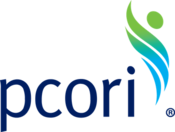The Patient-Centered Outcomes Research Institute (PCORI) is a United States–based non-profit institute created through the 2010 Patient Protection and Affordable Care Act. It is a government-sponsored organization charged with funding Comparative Effectiveness Research (CER) that assists consumers, clinicians, purchasers, and policymakers to make informed decisions intended to improve health care at both the individual and population levels, according to the Institute of Medicine.[1] Medicare considers the Institute's research in determining what sorts of therapies it will cover, although the institute's authorizing legislation set certain limits on uses of the research by federal health agencies.[2]
 | |
| Type | Nonprofit organization |
|---|---|
| Legal status | 501(c)(1) organization |
| Headquarters | Washington DC |
Executive Director | Nakela Cook |
| Russell M. Howerton | |
| Revenue | US$506,485,458 (in 2018) |
| Disbursements | US$2.41 billion (2010–2018) US$308 million (2018) |
| Website | pcori |
Funding
editPCORI is funded through the Patient-Centered Outcomes Research Trust Fund (PCORTF), which was authorized by the United States Congress as part of the Patient Protection and Affordable Care Act of 2010[3] and reauthorized through the Further Consolidated Appropriations Act, 2020.[4]
Its annual income comes from the general fund of the U.S. Treasury and a small fee assessed on Medicare, private health insurance, and self-insured plans. The act mandates a $2 fee, adjusted for inflation, for each person covered on a group plan.[5][6]
In 2018, PCORI's revenue was $506,485,458 with approved research awards of $308,000,000.[7] It made about $2 billion in commitments for funding awards between 2010 and 2017. About $1.6 billion (79%) of its commitments through fiscal 2017 were for research awards. $325 million (16%) was used to build the capacity to use existing health data for research.[8]
Research funding
editPCORI funds research studies that focus on patient-centered outcomes rather than only on CER alone.[9][10][2] Patient-centered outcomes research involves questions and outcomes that are "meaningful and important to patients and caregivers"[11] in order to help those individuals make informed decisions for their own care.
As of 2019, there have been 65 research standards developed to support patient-centered outcomes research.[12]
PCORI's authorizing legislation requires it "...to guarantee peer review of all research results and to make those results publicly accessible within 90 days of their receipt."[13]
Organizational structure
editThe organization is headquartered in Washington DC, and is registered as a 501(c)(1) non-profit organization. The institute's executive director is Nakela Cook,[14] and Russell M. Howerton is the head of the Board of Governors[15]
PCORnet
editFunding from PCORI enabled the development of PCORnet, a collaboration of several networks that support research using health data collected in the course of care through electronic health records, claims, and from patients. It established and maintains a common data model that allows analysis across many sites.[16]
See also
editReferences
edit- ^ Medicine, Institute of (June 30, 2009). Initial National Priorities for Comparative Effectiveness Research. doi:10.17226/12648. ISBN 978-0-309-13836-9.
- ^ a b "Social Security Act §1182". Social Security Agency. Retrieved April 13, 2014.
- ^ "Patient Centered Outcomes Research Trust Fund Fee: Questions and Answers | Internal Revenue Service". www.irs.gov. Retrieved August 7, 2019.
- ^ Pascrell B (December 20, 2019). "Text - H.R.1865 - 116th Congress (2019-2020): Further Consolidated Appropriations Act, 2020". www.congress.gov. Retrieved March 4, 2020.
- ^ Pipes, Sally. "Obamacare Increases Large Employers' Health Costs". Forbes. May 19, 2014.
- ^ "PCORI Fee Is Due by July 31 for Self-Insured Health Plans". SHRM. July 2, 2019. Retrieved September 4, 2019.
- ^ PCORI. "2018 Annual Report: Patient-Centered Outcomes Research Institute" (PDF). Retrieved July 17, 2019.
- ^ Office, U. S. Government Accountability (March 23, 2018). "Comparative Effectiveness Research: Activities Funded by the Patient-Centered Outcomes Research Trust Fund".: 5
- ^ Methodology Committee of the Patient-Centered Outcomes Research Institute (PCORI) (April 2012). "Methodological standards and patient-centeredness in comparative effectiveness research: the PCORI perspective". JAMA. 307 (15): 1636–40. doi:10.1001/jama.2012.466. PMID 22511692.
- ^ Neumann PJ, Weinstein MC (October 2010). "Legislating against use of cost-effectiveness information". The New England Journal of Medicine. 363 (16): 1495–7. doi:10.1056/NEJMp1007168. PMID 20942664.
- ^ Frank L, Basch E, Selby JV (October 2014). "The PCORI perspective on patient-centered outcomes research". JAMA. 312 (15): 1513–4. doi:10.1001/jama.2014.11100. PMID 25167382.
- ^ "PCORI Methodology Standards". www.pcori.org. November 12, 2015. Retrieved July 26, 2019.
- ^ Broitman M, Sox HC, Slutsky J (April 2019). "A Model for Public Access to Trustworthy and Comprehensive Reporting of Research". JAMA. 321 (15): 1453–1454. doi:10.1001/jama.2019.2807. PMID 30920580. S2CID 85546386.
- ^ Buarotti J (January 15, 2020). "AAMC Statement on Next PCORI Executive Director, Nakela Cook, MD". Association of American Medical College.
- ^ U. S. Government Accountability Office. "GAO Makes Appointments to PCORI Governing Board, New Chair and Vice Chair Named". www.gao.gov. U. S. Government Accountability Office. Retrieved November 30, 2022.
- ^ Fleurence RL, Curtis LH, Califf RM, Platt R, Selby JV, Brown JS (July 1, 2014). "Launching PCORnet, a national patient-centered clinical research network". Journal of the American Medical Informatics Association. 21 (4): 578–82. doi:10.1136/amiajnl-2014-002747. PMC 4078292. PMID 24821743.